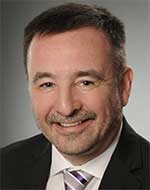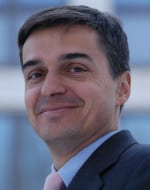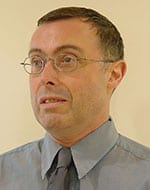Date: Wednesday, 17 April, 2019
Time: 11:00 – 18:30
Room: C1059
Track Description
The functionality of sensors and other IoT technologies have significantly improved and costs have dropped dramatically. Widely available infrastructure has made it possible to access powerful services that were available to few organizations just a short time ago. Consequently, we see the deployment of IoT applications, services, and processes in all settings. These include aspects of our daily life, the services provided in the public sector, and the management of processes in an industrial and commercial setting. In these developments, the use and exploitation of “Data” plays a central role.
At the heart of value and benefits of IoT is the analysis and exploitation of data in decision-making, and in the execution, of subsequent actions. The creation of “Data” in digital form and the fusion of “Data” from disparate sources enables fact-based analysis that is capable of dealing with the essential complexities of products, services, and processes. The typical use of “Data” can be characterized by three attributes: Volume, Velocity, and Variability. Each of these creates unique challenges that affect the feasibility and scalability of IoT solutions. While we benefit from digitalization, there are also many challenges that we must face in achieving acceptance in deployment and proliferation of practical IoT solutions.
In this track we will focus on the requirements for “Data” in typical applications, actual experiences with “Data” use in IoT deployments, and the opportunities and challenges that come from the collection of “Data” from IoT devices and other relevant sources. Topics we will address include but are not limited to:
- Data-driven business models (pay-per-use, etc.)
- From raw data to meaningful information, including AI and ML methodologies
- Advances in predictive and prescriptive analytics based on IoT data
- Edge and Cloud IoT data processing
- Data quality and data trustworthiness (Provenance)
- Lifecycle curation of Data
- Legal and regulatory aspects, e.g. “who owns the data?”
- IoT-related challenges in data privacy and security
Schedule
11:00-13:00 Session 1, The Power of Data
Talk 1 “Revolutionize Sports Data Through AI”, Helen Sun, STATS
Talk 2 “From Industry 4.0 to Data Economy”, Sebastian Steinbuß, International Data Space Association
Talk 3 “Unleash the Power of Data Sharing & AI – Telekom Data Intelligence Hub”, Sven Löffler, T-Systems
Panel Discussion
13:00-14:00 Lunch
14:00-16:00 Session 2, Non-functional Requirements
Talk 4 “Legal and Regulatory Aspects, e.g. Data Sovereignty and Liability Issues”, Alexander Duisberg, Bird & Bird
Talk 5 “IoT and Data Quality”, Munir Cochinwala, New Jersey Innovation Institute
Talk 6 “Data and Control in the Industrial Internet”, Stephen Mellor, Industrial Internet Consortium
Panel Discussion
16:00-16:30 Coffee Break
16:30-18:30 Session 3, IoT Data in Action
Talk 7 “Big Data Architectural Patterns and Best Practices for Energy Utility Monitoring”, David Boland, Analog Devices
Talk 8 “AI and the Smart Factory”, Christian Görg
Talk 9 “Autonomous Systems in Industry”, Marco Ulrich, ABB
Wrap-up and Summary
Track Co-Chairs
Thomas Hermsdorfer, SET Technologies
Thomas Hermsdorfer is Founder and CEO of SET Technology GmbH. He founded SET in 2007 and graduated in Business Administration. Thomas has had a long-standing career in business consulting, strategy development and technology consulting.
For 15 years, he served as a congressman for the Free State of Saxony and was involved in the State’s technology strategy and infrastructure. He led the parliamentary committee for Science, Universities, Media and Art over a period of several years. As such, he was they core university liaison and responsible for science policy. Both fields are regulated on a state level in Germany.
As a member of the Committee for Economic Affairs and Labor a key focus was on the creation of new economic reality in Saxony, one of the new German federal states after reunification. During Thomas’s political service, new business incubators were successfully established in Saxony as a link between R&D and the regional economy.
Starting in 1998, Thomas has established deep business relations with organizations at a number of key economic locations in the U.S. Together with the Economic Development Organization of Saxony, he created networks for market expansion, especially SMEs between 1998 and 2007. In collaboration with various Fraunhofer Institutes, Thomas has worked on several international programs in the U.S. and China. Fraunhofer Society is Europe’s largest application-oriented research organization.
Uwe Kubach, SAP SE
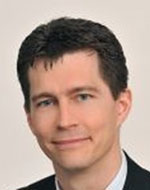

Dr. Uwe Kubach works as Vice President Digital Supply Chain (DSC) Enablement in SAP’s Products and Innovation board area. In this role he is responsible for explaining SAP’s DSC strategy to customers, partners, associations, and analysts as well as understanding their requirements and playing them back into SAP’s product management organizations.
In former roles at SAP he has been responsible for the global development of the IoT extensions within SAP’s technology platform and the launch of the SAP Research Center in Dresden, Germany, which he grew to one of the largest research centers within SAP.
He regularly acts as an industrial consultant to organizations like the European Commission, Fraunhofer Gesellschaft, and Industrie 4.0 Platform. He earned a doctorate title in computer science from the University of Stuttgart and an MBA from the Mannheim Business School and ESSEC Paris. He has been granted honorary professor from the University of Dresden.
Track Speakers
David Boland
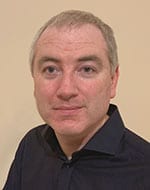

David has worked for Analog Devices for over 20 years and has extensive experience with all facets of software development and services, from lowly device drivers to large scale distributed software solutions.
David graduated from the University of Limerick in 1999 and holds a BSc in Computer Systems.
Talk Title: Big Data Architectural Patterns and Best Practices for Energy Utility Monitoring
Smart meters containing Analog Devices mSure technology enables energy companies to gain valuable insights into the health and utilization of their networks. By providing extensive usage and forecasting patterns companies can optimize network maintenance costs and increase revenue protection. These capabilities are derived from mSure reports that are securely transmitted along with regular energy metrology data to the network head-end system. A typical mSure enabled energy network will generate vast amounts of data that scale to volumes that are on par with other Big Data domains. Research and testing of early prototypes revealed that although the Big Data characteristics of value, velocity, veracity and variety are all favourable, it is nonetheless a significant challenge to process this volume of data in a cost effective manner. The major obstacles to a successful solution include compute costs and timely insight generation. The lessons gained through the continuous development, deployment, and testing of prototypes and subsequent minimum viable products resulted in several key learnings. These learnings and best practices ultimately enabled the development of our Analog Devices Energy Analytical Studio service that can scale to process millions of meters across wide geographical regions and provide our customers with valuable health and revenue protection insights. During the presentation we will outline the architecture of the Energy Analytical Studio service, discuss the key learnings that enable this architecture and detail the genesis behind those key learnings.
Munir Cochinwala
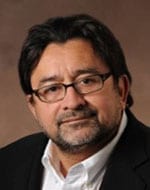

He has over twenty-five years of experience and is knowledge in all aspects of computer science with a focus on large-scale and mission-critical systems. He has deep expertise in data science, big data solutions and large scale systems with a strategic mindset and a passion for building out new capabilities.
He has been Principal Investigator for several research and deployment efforts funded by government and commercial customers such as IARPA & AT&T. He has over thirty publications in journals and holds nine patents.
Talk Title: IoT and Data Quality
Alexander Duisberg
Alexander Duisberg is a partner of Bird & Bird in Munich. His practice covers a wide range of contentious and non-contentious matters of technology law, including agile development, Big Data, cloud migration, transactional data protection and cyber security, digital transformation projects, Internet of Things, Industry 4.0 and technology disputes. His client base comprises suppliers and customers in a range of industries, in particular within the automotive, tech, mechanical engineering and insurance sectors.
Alexander has been invited to the Federal Government think-tanks “Trusted Cloud”, “Smart Data” and “Plattform Industrie 4.0”, and is member of the Steering Group of the Industrial Data Spaces Association.
Alexander is an appointed panelist to the WIPO Arbitration and Mediation Centre, and has deep experience in domestic and international arbitration on technology disputes.
Talk Title: Legal and Regulatory Aspects: Data Sovereignty and Liability Issues
As data is becoming the first and foremost driver and key asset of digital transformation, industry and stakeholders need to find their way of dealing with more complex legal issues. The common question of “who owns the data” has moved into a new perspective, on how to establish and manage data sovereignty in complex, networked ecosystems. Data access and fair contracting terms, consortium solutions for sharing raw and processed machine data stand next to the issue of protecting industrial know how in light of the EU Trade Secrets Directive. Where data from human-machine interfaces are at stake, the privacy implications of the GDPR are imminent. These challenges are inevitably complimented by the factual and regulatory demands of dealing with cyber security threats and related liability. The presentation discusses the legal framework from a European perspective, and sheds light on possible legal solutions in a dynamically evolving environment.
Christian Görg
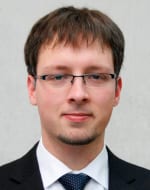

Talk Title: AI and the Smart Factory
Thomas Hermsdorfer, SET Technologies
Thomas Hermsdorfer is Founder and CEO of SET Technology GmbH. He founded SET in 2007 and graduated in Business Administration. Thomas has had a long-standing career in business consulting, strategy development and technology consulting.
For 15 years, he served as a congressman for the Free State of Saxony and was involved in the State’s technology strategy and infrastructure. He led the parliamentary committee for Science, Universities, Media and Art over a period of several years. As such, he was they core university liaison and responsible for science policy. Both fields are regulated on a state level in Germany.
As a member of the Committee for Economic Affairs and Labor a key focus was on the creation of new economic reality in Saxony, one of the new German federal states after reunification. During Thomas’s political service, new business incubators were successfully established in Saxony as a link between R&D and the regional economy.
Starting in 1998, Thomas has established deep business relations with organizations at a number of key economic locations in the U.S. Together with the Economic Development Organization of Saxony, he created networks for market expansion, especially SMEs between 1998 and 2007. In collaboration with various Fraunhofer Institutes, Thomas has worked on several international programs in the U.S. and China. Fraunhofer Society is Europe’s largest application-oriented research organization.
Sven Löffler
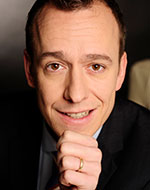

Talk Title: Unleash the Power of Data Sharing & AI – Telekom Data Intelligence Hub
Stephen Mellor
Stephen Mellor is the Chief Technical Officer for the Industrial Internet Consortium, where he directs the standards requirements and technology & security priorities for the Industrial Internet. In that role, he coordinates the activities of the several engineering, architecture, security and testbed working groups and teams.
Sebastian Steinbuß
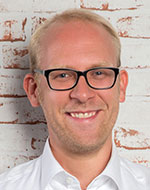

Talk Title: From Industry 4.0 to Data Economy
Helen Sun
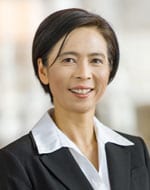

Dr. Sun joins STATS from JPMorgan Chase, most recently serving as Chief Technology Officer of the Commercial Banking division. For over 22 years, Sun has a proven record as a technology strategist and thought leader in previous roles as Vice President of Cloud Computing, Information Management, and Architecture at Motorola Solutions; Senior Director of Global Enterprise Architecture at Salesforce; and Director of Enterprise Architecture at Oracle.
Dr. Sun is a leader in transforming businesses through innovative solutions, and has published 3 books on the topics of big data and advanced analytics.
Sun earned a Ph.D. in Education Technology and Information Systems from The University of Toledo prior to her extensive leadership experience across multiple financial and software organizations. She has been recognized by the Chicago Business Journal as “Business Woman of the Year” and as a featured speaker at the University of Chicago’s “Women in Analytics” symposium. On July 16, 2018, Dr. Sun was recognized in Crain’s Tech 50 of 2018.
Talk TItle: Revolutionize Sports Data Through AI
Marco Ulrich
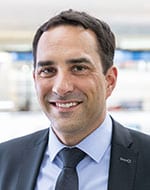

He received his diploma degree in physics from the University of Karlsruhe, Germany in 2004 with the main focus on solid state optics and electron-spin resonance. In 2007 he received his PhD degree in Physics from University of Heidelberg in co-operation with the German Cancer Research Center on medical NMR spectroscopy.
Talk Title: Autonomous Systems in Industry
Progress in IT and communication technologies are the main driver for the digital transformation in domains such as industrial automation and power industries. Devices, things and people are more and more connected in the IIoT (Industrial Internet of Things) and a vast amount of data becomes available. New emerging technologies such as artificial intelligence and advanced data analytics will impact the new digital industries in a strong way: old and established business models will fade out and new opportunities will appear. This will be the basis for autonomous systems in industry.
In this talk, an industrial view on this new eco-system will be provided and discussed: how do IoT technologies play together with artificial intelligence and data analytics and how will this lead to autonomous systems in industry? Finally, some concrete examples from an industrial ABB perspective will be provided. The focus will lie on industrial automation and electro-mobility use-cases.



